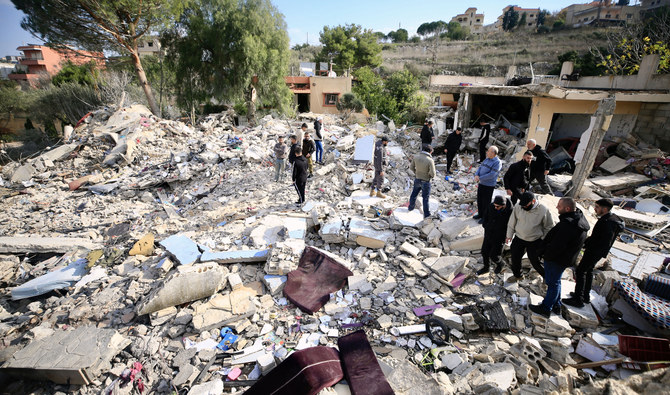BEIRUT: As hostilities between Hezbollah and the Israeli army along Lebanon’s southern border have de-escalated over the past few days, some displaced residents have taken the opportunity during the relative calm to return and check the condition of their homes.
“The material and moral damage is significant, and the village lost the largest number of young martyrs,” said a woman from the Bazzi family, who fled the village of Bint Jbeil for the safety of Mount Lebanon. “I don’t know how Bint Jbeil could be rebuilt.”
Meanwhile, Hezbollah forces on Monday targeted Israeli soldiers near the Branit barracks and spy equipment at Al-Raheb outpost with missile attacks. Explosions could be heard in the Galilee Panhandle and Kiryat Shmona. The situation in southern Lebanon is closely linked to developments in negotiations with Hamas over the war in Gaza.
Elsewhere, the fierce rivalry between Hezbollah and the Amal Movement continues to grow in areas controlled by the former, as both parties compete to extend their power in each other’s strongholds, particularly the southern suburbs of Beirut and surrounding villages.
A Lebanese security source said there have been repeated clashes in areas where the parties have been vying for support in the run-up to Ashura, an Islamic day of commemoration that falls this year on July 16. Religious tents have been set up for the celebration outside mosques and in other public spaces in Beirut’s southern suburbs.
Clashes between Hezbollah and Amal supporters so far have been largely contained before they could escalate, as both groups seek to assert their influence in neighborhoods. Their rivalry peaked on Saturday night when members of the Amal Movement set up a checkpoint and prevented a resident of the suburb of Hay Madi from reaching his building by car, citing security concerns as a pretext.
The incident escalated into an exchange of insults and then a fistfight before shots were fired by an Amal supporter. Other armed individuals intervened, demanding the checkpoint be removed, and the residential area became a war zone as heavy gunfire forced women, children and elderly residents to flee in terror.
Hezbollah security official Samir Kabbani was shot in the head and killed during the fighting. A number of civilians were reportedly injured. The security source said the clash was “not the first but the bloodiest.”
Ali Al-Amin, the editor-in-chief of the Janoubia news website, said a previously declared alliance between Hezbollah and the Amal Movement to confront Israel along the southern border is a forced arrangement and does not reflect any sense of harmony between the parties.
Ashura has “turned from a religious commemoration into an occasion for displaying power,” he added. “Each party now tries to show its capabilities and dominance by encroaching on the territory of others.
“The Hay Madi neighborhood in the southern suburbs of Beirut serves as an extension of the security zone for Hezbollah in the suburbs. Consequently, the clash may have been intended to reinforce the demarcation of influence boundaries.”
The conflict might also have stemmed from a “prevailing atmosphere of demagoguery,” as politicians attempt to appeal to people’s desires and prejudices, Al-Amin added.
Amid the long-running, severe economic crisis in Lebanon, Hezbollah has allocated $3 million to set up religious reception sites, a resident of the southern suburbs said. Each site received $10,000 to fund the distribution of food, drinks and sweets to residents, they added.
Al-Amin said the extravagance of organizing such events indicated “a desire to control the population.”
He added: “These manifestations were not seen last year but are now accompanied by a war led by Hezbollah in the south, resulting in prolonged displacement and unease among residents who had heavily invested in the south under the assumption of its stability.
“Despite the populace’s agitation and their feeling of oppression, disgust and dissatisfaction, they are under the sway of Hezbollah as it is the sole entity that has asserted its capability to compensate the people. Additionally, it wields significant security influence, which may have played a part in the clashes with the Amal movement.
“People might protest and express their dissent but where can they turn to? They will ultimately return to those who offer them protection, and this authority currently lies not with the government but with Hezbollah, who proclaim this both in words and actions.”




























